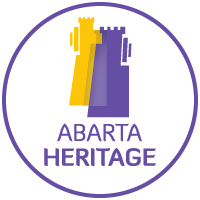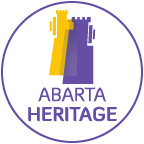A highly experienced team of dedicated, innovative and thoroughly nice people
Meet the team behind Abarta Heritage.
Abarta Heritage are an award-winning Tipperary-based company, and we are passionate about empowering communities and helping to communicate Ireland’s story to visitors. Our team have over 100 years combined experience in archaeology and heritage. We are all passionate about communicating the story of Ireland, and we love to help empower people to take an active role in researching, protecting and presenting their local heritage.
Róisín has worked in archaeology in Ireland since 1999. From Clonmel in Co. Tipperary, she has excavated on archaeological sites of all periods all around Ireland, including the Woodstown Viking site. She also managed the Burial Ground Survey for County Mayo which involved surveying over 600 burial grounds throughout the county.
Róisín has been the managing director of Abarta Heritage, since 2014. In that time she has worked extensively in the field of heritage tourism. She specialises in community engagement, and project manages the flagship ‘Irish Walled Towns Network’ and ‘Adopt a Monument’ Schemes for Abarta Heritage on behalf of the Heritage Council of Ireland. She also helps with designing and delivering bespoke training programmes, tour guide training and mentoring services – helping to empower communities to tell the story of their local heritage. She is passionate about communicating the work community groups do across the country to preserve and protect their heritage for future generations.
Handily enough, Róisín’s favourite site is St Patrick’s Well, in Marlfield just outside our hometown of Clonmel. According to the Book of Lismore, St. Patrick reputedly visited the well on his way to visit St. Declan in Ardmore. The water is said to be a cure for headaches and sore eyes. It is a beautiful, tranquil and atmospheric spot, and we are very lucky to have it right on our doorstep.
Róisín Burke, Managing Director
Originally from the North-West of England, Neil moved to Ireland to work in archaeology in 1999 and has since fallen madly in love with the country, finally becoming an Irish citizen in 2020. Neil has worked on archaeological sites all around Ireland, and has an omnivorous interest in all periods and places – but with a special grá for Neolithic passage tombs, early medieval monastic sites and the Vikings.
Neil’s chief passion is in sharing the wonder of Irish archaeology and heritage sites with the general public. As well as the archaeological publication The Mill at Kilbegly (2013), Neil has written two popular guidebooks to Ireland’s Ancient East (2016) and The Wild Atlantic Way (2018), and a large number of articles in national media publications. Neil has also lectured in Public Archaeology at UCD School of Archaeology, and carried one of Ireland’s largest public archaeology projects at the Hellfire Club in the Dublin Mountains. Neil has worked on a large number of plans and reports that all seek to connect people to place. Neil is also the host of our Amplify Archaeology Podcast series – an ideal outlet for someone who just loves to chat about the past!
Neil’s favourite site is Skellig Michael – not only is it a truly spectacular early medieval monastic site, but it is also home to Ireland’s largest puffin colony – and if there’s one thing that obsesses Neil more than archaeology it’s puffins!
Neil Jackman, Director
Tara has been part of the Abarta Heritage team since 2019. She was awarded first-class honours Bachelors and Masters degrees in Archaeology from University College Dublin, where she developed a strong interest in prehistory and experimental archaeology, and carried out innovative research on bone pins of Neolithic passage tombs. Tara also has a particular interest in genealogical research, having created many family trees and histories for families across Ireland.
Over the years, Tara has worked on various archaeological projects including surveys, excavation and post-excavation of fantastic sites such as Knockroe Passage Tomb and Rathfarnham Castle. After working in the archaeological sector, she moved into the heritage and tourism sector where she designed historical tours and trained guides for commercial journeys across Ireland and the UK.
Today Tara works on a variety of projects with Abarta – from researching and writing scripts and tours, to community engagement, interpretation and tour guide training. Tara’s current favourite site is the Knockgraffon Motte in County Tipperary. The enormous man-made mound has spectacular views of the surrounding mountains and countryside which makes you understand why it was chosen as the location of a defensive site by the Normans, and there is the possibly of it being an earlier inauguration site. There’s even a nice castle and medieval church nearby, all part of a fantastic medieval landscape.
Tara Clarke
Sharon has worked in many areas of archaeology including research, education, commercial and field school excavations and community heritage. Her research interests include early medieval settlement and medieval walled towns. Her doctoral research was on the settlement on Mayo’s islands during the early medieval period and she has published on aspects of this as well as early medieval metalwork, local history, urban medieval archaeology and the even archaeology of beekeeping.
Sharon is passionate about education and engagement with heritage, and she has taught in undergraduate and Adult Ed programmes in UCD and Maynooth University and has been involved in field schools in different parts of the country. In recent years she has largely been involved in community heritage projects, many relating to her local town. Sharon is currently the Editor of Archaeology Ireland magazine and is a strong believer in the importance of making archaeology and heritage accessible to all. Sharon’s favourite monument is Killeen Cormac, an early Christian site on the Kildare Wicklow border. It has a special atmosphere and research is showing that there is so much more to it than the little graveyard that survives.
Dr. Sharon Greene
Sara holds a BSc of Archaeology, Museology & Art History from Umea University, Sweden and an MA in the Archaeology of Art & Architecture from UCD. She specialises in archaeological illustration, technical drawings and graphics for publication, exhibition, presentation and promotion.
Sara has collaborated with national institutions such as the National Museum of Ireland, University College Dublin and Transport Infrastructure Ireland, and has published and delivered lectures, workshops and training on the heritage applications of illustration and graphics.
Sara works on a number of innovative design and interpretation projects with Abarta, and specialises in creating engaging designs for panels, brochures and educational packs for schools. Her reconstruction illustrations really help to put the people back into the past, and she has created a number of fun and engaging colouring books that make engaging with Irish heritage fun for all the family.
Sara’s favourite site is Meevagh Cross and Church in County Donegal. It’s an atmospheric site in a truly stunning location!
Sara Nylund
Ruth joined the Abarta Heritage team in March 2022 as our Marketing and Communications Strategist. Soon after completing her studies in Celtic Civilisation and Archaeology in University College Dublin, she found herself working on business expansion and communication projects in West and Central Africa. During those six years in Equatorial Guinea and Cameroon, she found the time to develop her interest in natural history and even had the privilege of helping care for two orphaned chimpanzees, Shakira and Little Sam, and a baby gorilla, Sarah.
Ruth’s favourite site to visit is the beautiful site of Glendalough, in County Wicklow, which combines her interests in Early Christian Ireland, Irish folklore and, of course, Irish wildlife. Her favourite time to visit is at dusk, when the many resident bats begin to take flight through the monastic city, and along the lake’s shores.
Ruth Fitzpatrick
Peig is our expert osteobarkaeologist at Abarta Heritage, and has a speciality in bone analysis. She has extensive experience in digging, treats, scritching and snugs. She is often the most vocal member of the team, saving her many loud pronouncements for when Neil and Róisín are stuck in a Zoom meeting.
As well as her work in osteobarkaeology, Peig is also a registered Irish Therapy Dog. She visits a primary school outside our hometown of Clonmel each week to assist children with reading.
Peig, Osteobarkaeologist
Róisín Burke
Managing Director
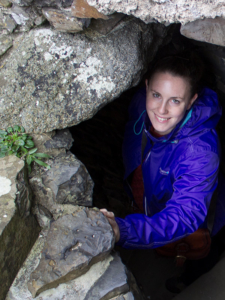
Róisín has worked in archaeology in Ireland since 1999. From Clonmel in Co. Tipperary, she has excavated on archaeological sites of all periods all around Ireland, including the Woodstown Viking site. She also managed the Burial Ground Survey for County Mayo which involved surveying over 600 burial grounds throughout the county.
Róisín has been the managing director of Abarta Heritage, since 2014. In that time she has worked extensively in the field of heritage tourism. She specialises in community engagement, and project manages the flagship ‘Irish Walled Towns Network’ and ‘Adopt a Monument’ Schemes for Abarta Heritage on behalf of the Heritage Council of Ireland.
She also helps with designing and delivering bespoke training programmes, tour guide training and mentoring services – helping to
empower communities to tell the story of their local heritage. She is passionate about communicating the work community groups do across the country to preserve and protect their heritage for future generations.
Handily enough, Róisín’s favourite site is St Patrick’s Well, in Marlfield just outside our hometown of Clonmel. According to the Book of Lismore, St. Patrick reputedly visited the well on his way to visit St. Declan in Ardmore. The water is said to be a cure for headaches and sore eyes. It is a beautiful, tranquil and atmospheric spot, and we are very lucky to have it right on our doorstep.
Neil Jackman
Director
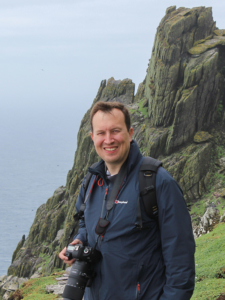
Originally from the North-West of England, Neil moved to Ireland to work in archaeology in 1999 and has since fallen madly in love with the country, finally becoming an Irish citizen in 2020. Neil has worked on archaeological sites all around Ireland, and has an omnivorous interest in all periods and places – but with a special grá for Neolithic passage tombs, early medieval monastic sites and the Vikings.
Neil’s chief passion is in sharing the wonder of Irish archaeology and heritage sites with the general public. As well as the archaeological publication The Mill at Kilbegly (2013), Neil has written two popular guidebooks to Ireland’s Ancient East (2016) and The Wild Atlantic Way (2018), and a large number of articles in national media publications. Neil has also lectured in Public Archaeology at UCD School of Archaeology, and carried one of Ireland’s largest public archaeology projects at the Hellfire Club in the Dublin Mountains. Neil has worked on a large number of plans and reports that all seek to connect people to place. Neil is also the host of our Amplify Archaeology Podcast series – an ideal outlet for someone who just loves to chat about the past!
Neil’s favourite site is Skellig Michael – not only is it a truly spectacular early medieval monastic site, but it is also home to Ireland’s largest puffin colony – and if there’s one thing that obsesses Neil more than archaeology it’s puffins!
Tara Clarke
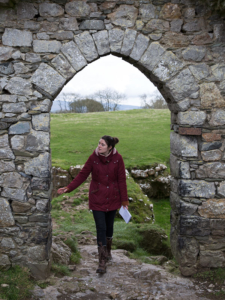
Tara has been part of the Abarta Heritage team since 2019. She was awarded first-class honours Bachelors and Masters degrees in Archaeology from University College Dublin, where she developed a strong interest in prehistory and experimental archaeology, and carried out innovative research on bone pins of Neolithic passage tombs. Tara also has a particular interest in genealogical research, having created many family trees and histories for families across Ireland.
Over the years, Tara has worked on various archaeological projects including surveys, excavation and post-excavation of fantastic sites such as Knockroe Passage Tomb and Rathfarnham Castle. After working in the archaeological sector, she moved into the heritage and tourism sector where she designed historical tours and trained guides for commercial journeys across Ireland and the UK.
Today Tara works on a variety of projects with Abarta – from researching and writing scripts and tours, to community engagement, interpretation and tour guide training. Tara’s current favourite site is the Knockgraffon Motte in County Tipperary. The enormous man-made mound has spectacular views of the surrounding mountains and countryside which makes you understand why it was chosen as the location of a defensive site by the Normans, and there is the possibly of it being an earlier inauguration site. There’s even a nice castle and medieval church nearby, all part of a fantastic medieval landscape.
Sara Nylund
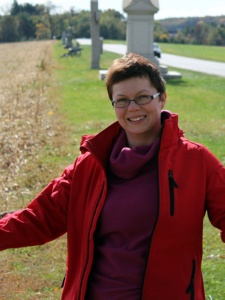
Sara holds a BSc of Archaeology, Museology & Art History from Umea University, Sweden and an MA in the Archaeology of Art & Architecture from UCD. She specialises in archaeological illustration, technical drawings and graphics for publication, exhibition, presentation and promotion.
Sara has collaborated with national institutions such as the National Museum of Ireland, University College Dublin and Transport Infrastructure Ireland, and has published and delivered lectures, workshops and training on the heritage applications of illustration and graphics.
Sara works on a number of innovative design and interpretation projects with Abarta, and specialises in creating engaging designs for panels, brochures and educational packs for schools. Her reconstruction illustrations really help to put the people back into the past, and she has created a number of fun and engaging colouring books that make engaging with Irish heritage fun for all the family.
Sara’s favourite site is Meevagh Cross and Church in County Donegal. It’s an atmospheric site in a truly stunning location!
Dr. Sharon Greene
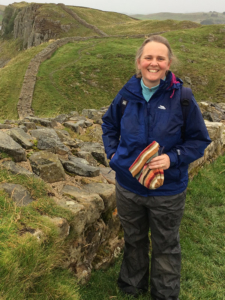
Sharon has worked in many areas of archaeology including research, education, commercial and field school excavations and community heritage. Her research interests include early medieval settlement and medieval walled towns. Her doctoral research was on the settlement on Mayo’s islands during the early medieval period and she has published on aspects of this as well as early medieval metalwork, local history, urban medieval archaeology and the even archaeology of beekeeping.
Sharon is passionate about education and engagement with heritage, and she has taught in undergraduate and Adult Ed programmes in UCD and Maynooth University and has been involved in field schools in different parts of the country. In recent years she has largely been involved in community heritage projects, many relating to her local town. Sharon is currently the Editor of Archaeology Ireland magazine and is a strong believer in the importance of making archaeology and heritage accessible to all. Sharon’s favourite monument is Killeen Cormac, an early Christian site on the Kildare Wicklow border. It has a special atmosphere and research is showing that there is so much more to it than the little graveyard that survives.
Ruth Fitzpatrick
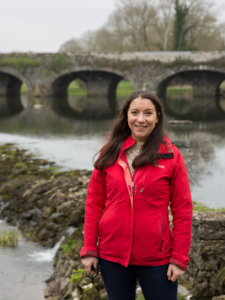
Ruth joined the Abarta Heritage team in March 2022 as our Marketing and Communications Strategist. Soon after completing her studies in Celtic Civilisation and Archaeology in University College Dublin, she found herself working on business expansion and communication projects in West and Central Africa. During those six years in Equatorial Guinea and Cameroon, she found the time to develop her interest in natural history and even had the privilege of helping care for two orphaned chimpanzees, Shakira and Little Sam, and a baby gorilla, Sarah.
Ruth’s favourite site to visit is the beautiful site of Glendalough, in County Wicklow, which combines her interests in Early Christian Ireland, Irish folklore and, of course, Irish wildlife. Her favourite time to visit is at dusk, when the many resident bats begin to take flight through the monastic city, and along the lake’s shores.
Peig
Osteobarkaeologist
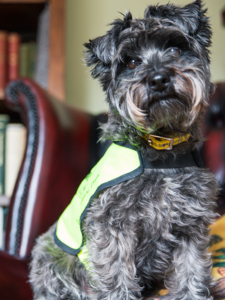
Peig is our expert osteobarkaeologist at Abarta Heritage, and has a speciality in bone analysis. She has extensive experience in digging, treats, scritching and snugs. She is often the most vocal member of the team, saving her many loud pronouncements for when Neil and Róisín are stuck in a Zoom meeting.
As well as her work in osteobarkaeology, Peig is also a registered Irish Therapy Dog. She visits a primary school outside our hometown of Clonmel each week to assist children with reading.
Discover more about Abarta Heritage, our mission and find the origin of our name
